Recognized as a leading center for academic excellence in creating dynamic technocrats and researchers in the field, the Department of Electronics and Communication Engineering at SVCE nurtures students with a sound technical foundation through efficient teaching-learning processes and state–of–the–art infrastructure. The Department is focused on instilling ethical values, leadership attributes, lifelong learning, individual and teamwork capabilities amongst the students through holistic education. The UG and research programs highlight passing cutting-edge expertise with forward-looking pedagogy while addressing the underlying concerns linked to the domain.
To be a centre of excellence in Electronics, Communication and allied domains for Education and Research.
Nurture students with strong technical foundation through effective teaching-learning processes and state-of-the-art infrastructure.
Inculcate ethical values, leadership qualities, lifelong learning, individual and teamwork abilities amongst the students through holistic education.
Collaborate with industry and society to provide eco-friendly and sustainable solutions.
Knowledge
Electronics & Communication Engineering Graduates will haveprofessional& technical career in inter disciplinary domains providing innovative and sustainable solutions using modern tools.
Skills
Electronics & Communication Engineering Graduates will have effective communication, leadership, team building, problem solving, decision-making and creative skills.
Attitude
Electronics & Communication Engineering Graduates will practice ethical responsibilities towards their peers, employers and society.
Ability to learn and implement the new technologies in Electronics and Communication domain. Note:{This is accessed by mini project activities using the time/duration}
PCB DesignAbility to Design and manufacture simple and complex Electronic Circuit boards for various applications Note:{through workshops assessments}
Quick Learner
Ability to learn and implement the new technologies in Electronics and Communication domain.
Note:{This is accessed by mini project activities using the time/duration}
PCB Design
Ability to Design and manufacture simple and complex Electronic Circuit boards for various applications
Note:{through workshops assessments}
1. Engineering Knowledge: Apply the knowledge of mathematics, science, engineering fundamentals, and an engineering specialization to the solution of complex engineering problems.
2. Problem Analysis: Identify, formulate, research literature, and analyze complex engineering problems reaching substantiated conclusions using first principles of mathematics, natural sciences, and engineering sciences.
3. Design/development of Solutions: Design solutions for complex engineering problems and design system components or processes that meet the specified needs with appropriate consideration for the public health and safety, and the cultural, societal, and environmental considerations.
4. Conduct Investigations of Complex Problems: Use research-based knowledge and research methods including design of experiments, analysis and interpretation of data, and synthesis of the information to provide valid conclusions.
5. Modern Tool usage: Create, select, and apply appropriate techniques, resources, and modern engineering and IT tools including prediction and modeling to complex engineering activities with an understanding of the limitations.
6. The Engineer and Society: Apply reasoning informed by the contextual knowledge to assess societal, health, safety, legal and cultural issues and the consequent responsibilities relevant to the professional engineering practice.
7. Environment and Sustainability: Understand the impact of the professional engineering solutions in societal and environmental contexts, and demonstrate the knowledge of, and need for sustainable development.
8. Ethics: Apply ethical principles and commit to professional ethics and responsibilities and norms of the engineering practice.
9. Individual and Team Work: Function effectively as an individual, and as a member or leader in diverse teams, and in multidisciplinary settings.
10. Communication: Communicate effectively on complex engineering activities with the engineering community and with society at large, such as, being able to comprehend and write effective reports and design documentation, make effective presentations, and give and receive clear instructions.
11. Project Management and Finance: Demonstrate knowledge and understanding of the engineering and management principles and apply these to one’s own work, as a member and leader in a team, to manage projects and in multidisciplinary environments.
12. Life-long Learning: Recognize the need for, and have the preparation and ability to engage in independent and life-long learning in the broadest context of technological change.
Knowledge
Electronics & Communication Engineering Graduates will haveprofessional& technical career in inter disciplinary domains providing innovative and sustainable solutions using modern tools.
Skills
Electronics & Communication Engineering Graduates will have effective communication, leadership, team building, problem solving, decision-making and creative skills.
Attitude
Electronics & Communication Engineering Graduates will practice ethical responsibilities towards their peers, employers and society.
Quick Learner
Ability to learn and implement the new technologies in Electronics and Communication domain.
Note:{This is accessed by mini project activities using the time/duration}
PCB Design
Ability to Design and manufacture simple and complex Electronic Circuit boards for various applications
Note:{through workshops assessments}
1. Engineering Knowledge: Apply the knowledge of mathematics, science, engineering fundamentals, and an engineering specialization to the solution of complex engineering problems.
2. Problem Analysis: Identify, formulate, research literature, and analyze complex engineering problems reaching substantiated conclusions using first principles of mathematics, natural sciences, and engineering sciences.
3. Design/development of Solutions: Design solutions for complex engineering problems and design system components or processes that meet the specified needs with appropriate consideration for the public health and safety, and the cultural, societal, and environmental considerations.
4. Conduct Investigations of Complex Problems: Use research-based knowledge and research methods including design of experiments, analysis and interpretation of data, and synthesis of the information to provide valid conclusions.
5. Modern Tool usage: Create, select, and apply appropriate techniques, resources, and modern engineering and IT tools including prediction and modeling to complex engineering activities with an understanding of the limitations.
6. The Engineer and Society: Apply reasoning informed by the contextual knowledge to assess societal, health, safety, legal and cultural issues and the consequent responsibilities relevant to the professional engineering practice.
7. Environment and Sustainability: Understand the impact of the professional engineering solutions in societal and environmental contexts, and demonstrate the knowledge of, and need for sustainable development.
8. Ethics: Apply ethical principles and commit to professional ethics and responsibilities and norms of the engineering practice.
9. Individual and Team Work: Function effectively as an individual, and as a member or leader in diverse teams, and in multidisciplinary settings.
10. Communication: Communicate effectively on complex engineering activities with the engineering community and with society at large, such as, being able to comprehend and write effective reports and design documentation, make effective presentations, and give and receive clear instructions.
11. Project Management and Finance: Demonstrate knowledge and understanding of the engineering and management principles and apply these to one’s own work, as a member and leader in a team, to manage projects and in multidisciplinary environments.
12. Life-long Learning: Recognize the need for, and have the preparation and ability to engage in independent and life-long learning in the broadest context of technological change.

Professor & HOD
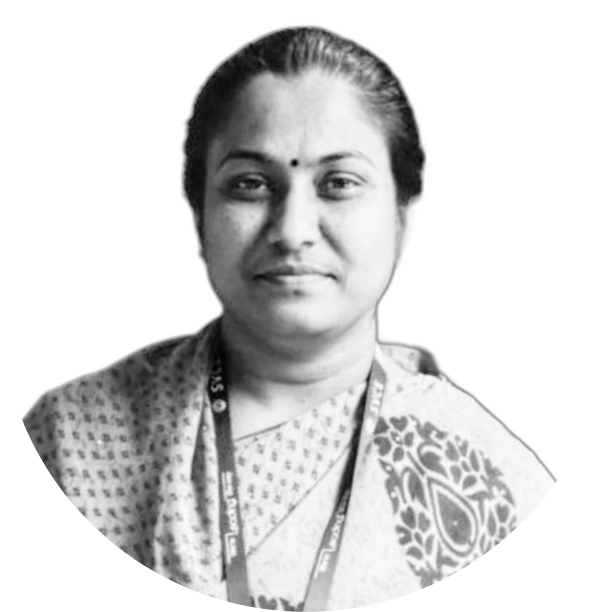
Professor & Dean (Academics)

Associate Professor

Associate Professor

Associate Professor

Associate Professor
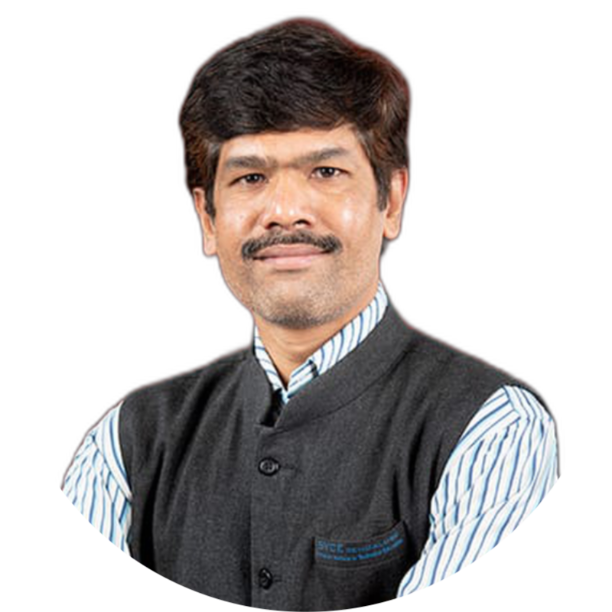
Registrar & Assistant Professor
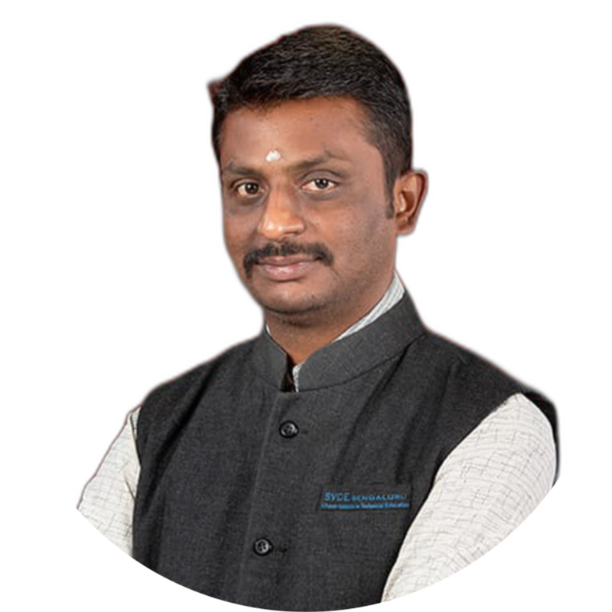
Assistant Professor

Assistant Professor

Assistant Professor

Assistant Professor

Assistant Professor

Assistant Professor

Assistant Professor

Assistant Professor
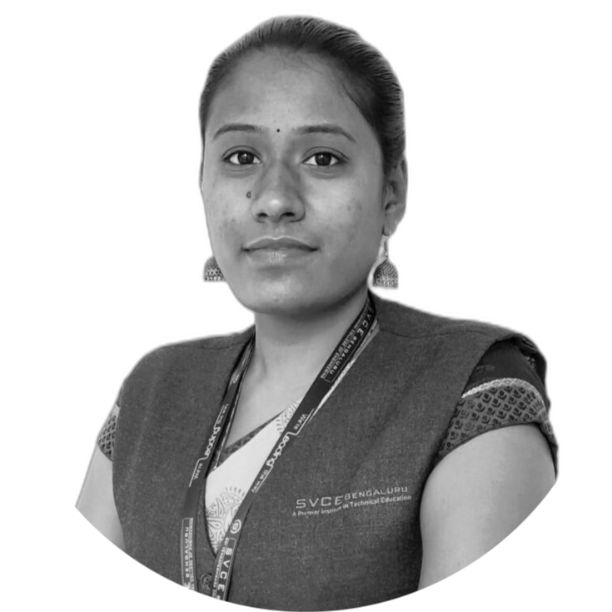
Assistant Professor

Assistant Professor

Assistant Professor

Assistant Professor

Assistant Professor

Assistant Professor

Assistant Professor
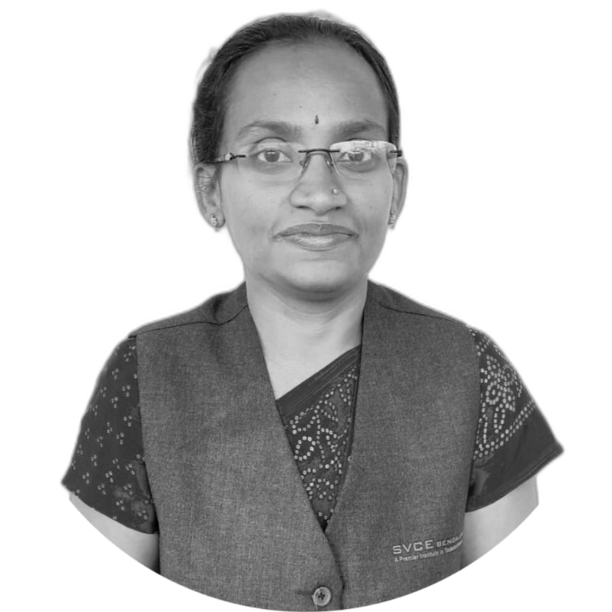
Assistant Professor

Assistant Professor
Sri Venkateshwara College of Engineering (SVCE) Vidyanagar, Kempegowda International Airport Road, Bettahalsoor Post Chikkajala Bengaluru North Taluk, Bengaluru Urban District Karnataka – 562157.
|
Type
|
Degree
|
DMS
|
|---|---|---|
|
Latitude
|
||
|
Longitude
|